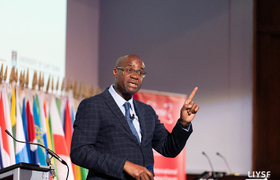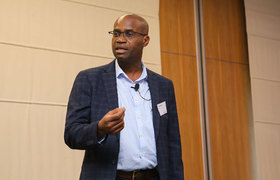Prestigious international fellowship for Prof Kelly Chibale
13 November 2025 | Story Niémah Davids. Photo Lerato Maduna. Read time 4 min.
The accolades keep rolling in for renowned scientist and the University of Cape Town’s (UCT) very own Professor Kelly Chibale. His latest honour is being named Distinguished International Fellow of the American Society of Tropical Medicine and Hygiene (ASTMH).
The ASTMH is the oldest and largest scientific society in the world and is dedicated to reducing the world-wide burden of infectious diseases and improving global health. The organisation’s international fellowship recognises outstanding accomplishments by an individual who is not an American citizen and who has made “eminent contributions to some phase of tropical medicine and hygiene”.
“This [fellowship] means a lot to me.”
Professor Chibale, the Neville Isdell Chair in African-centric Drug Discovery and Development, and the founder and director of UCT’s Holistic Drug Discovery and Development (H3D) Centre, said he is thrilled and grateful to receive the prestigious honour. His contribution to the field of tropical medicine and hygiene, and the international fellowship were recognised at the ASTMH’s Annual Meeting in Toronto, Canada, held from 9 to 13 November.
Support a culture of research excellence
“This [fellowship] means a lot to me. I feel that the collective work of my team members – both past and present – at UCT and H3D, as well as research and funding partners is being recognised through me,” he said. “It is an individual award, but I represent these various stakeholders whose contributions I acknowledge with gratitude.”
Elaborating on what this fellowship means for UCT, the country and the continent, Chibale said it demonstrates that Africa is being recognised on the global stage for its research into tropical medicine and hygiene.
“We can be proud of the world-class research coming out of UCT, South Africa and Africa. With this comes the responsibility to ensure that we continue to strive to do our very best to sustain what is excellent, to be agents of change and do better at supporting a culture of research excellence while providing an enabling environment,” he said.
Keynote address
In honour of his work, the ASTMH also invited Chibale to deliver the Commemorative Lecture, which took place during the closing plenary keynote session at the annual meeting on Thursday, 13 November.
Titled “Global health innovation through networks of partnerships”, Chibale’s lecture unpacked the importance of both research and funding partnerships, supported by a network of partnership models that involve multiple stakeholders, including academic institutions, industry and product developers. He focused on the importance of developing a strong mentorship and knowledge transfer component to ensure that partners have access to common centres of excellence while they work on globally aligned projects.
“I hope I was able to inspire the more than 3 000 delegates present in person and virtually with my message.”
“In such a model, partners don’t need to have all the infrastructure, resources, expertise or technologies. All partners need is to focus on what they can do from their home institution with what they have and rely on other partners to address gaps,” he said. “Being asked to deliver the closing keynote at this highly prestigious meeting is very special. I hope I was able to inspire the more than 3 000 delegates present both in person and virtually with my message.”
 This work is licensed under a Creative Commons Attribution-NoDerivatives 4.0 International License.
This work is licensed under a Creative Commons Attribution-NoDerivatives 4.0 International License.
Please view the republishing articles page for more information.










